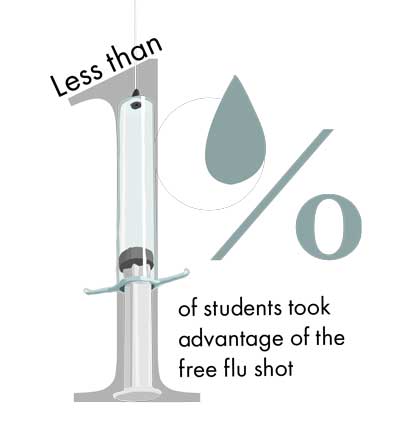Story by Abby Siegel, Contributing writer

A student walks into Waterfield Library. Steering to the left, she heads toward Starbooks for a snack and passes by a student who sneezes in her direction. According to the Center for Disease Control, even if she is six feet away from that person, Influenza might have found it’s next target.
Influenza – commonly known as the flu – affects 5 to 20 percent of the American population each year, according to the Center for Disease Control. Flu spreads from person to person, making the University campus a petri dish for the virus, especially in residential colleges and classrooms. The flu is highly contagious and spreads most commonly through the air as liquid droplets from coughs and sneezes.
Symptoms include chills, headache, sore muscles, cough, sore throat, fatigue, vomiting and diarrhea. Those with mild symptoms should feel better in less than a week. On average, each year 200,000 Americans are hospitalized because of the flu. A flu shot can reduce the risk of getting the virus or can make the symptoms milder for those who get the virus.
Kim Paschall, director of Health Services, recommends that all students get vaccinated.
“They are protecting themselves and other people,” Paschall said. “It’s important to the wellness of the whole campus.”
Despite the benefits of the flu vaccination, many college students decide not to get the shot. Last fall, free flu shots were offered on campus and about 200 students got the shot.

Kristin Henson, senior from Mayfield, Kentucky, said she doesn’t believe the shot is a “fix all” for all students.
In 2011, Henson got a flu shot but later developed the flu and was hospitalized because her fever was so high.
“I haven’t got one since,” she said.
Henson doesn’t think the vaccination is bad, however, and said she believes it is a good prevention strategy as she used to get the shot every year.
Health Services administers flu shots beginning mid-September, but the ideal time to get a vaccination is at the start of October, as flu season runs from October to May.
Paschall said the vaccinations provided by Health Services won’t give people the flu because they are dead viruses that allow your body to create antibodies against the virus. Allergic reactions are not common from the shot.
When and where to get a free flu shot:
Oct. 6:
9 a.m. to 2 p.m.
Curris Center
and
4 p.m. to 6 p.m.
Wellness Center
Oct 8:
9 a.m. to 2 p.m.
Curris Center
Faculty and staff can receive free flu shots on Oct. 28
Many students have never had a flu shot in their lifetime. Shannon Adington, junior from Stanford, Kentucky, is one of them.
“I never went to the doctor as a kid,” Adington said. “Medical institutions are normal for those who went a lot as a child.”
She said she doesn’t get sick very often, but she attributes her mild colds at the start of each semester to living on campus.
“So far it hasn’t been necessary for me,” she said in regard to the flu shot.
On the other hand, other students, like Michael Simon, senior from Louisville, Kentucky, said they have gotten the flu shot every year since childhood.
Simon said he has had the flu shot every year since his childhood and has never had the flu.
“If you have never had the flu then you’re probably not worried about it,” Simon said about students who refuse to get the flu shot.
He said he encourages all students to get the flu shot because he has seen how it affects the body, as many of his friends have had it.
Health Services administers free flu shots throughout the year. If you have symptoms of the flu, Paschall recommends stopping by Health Services to make sure there are no other illnesses to be aware of such as a secondary bacterial infection. Additionally, rest, drinking plenty of fluids, isolating yourself and taking Tylenol for fever are important steps to combat the flu once you have the virus.
Preventative action, in addition to a flu shot, should be taken against the flu. Paschall recommends practicing good hand-washing, drinking plenty of water, getting plenty of rest, covering your cough, eating healthy and avoiding those who are sick.
Health Services will be providing free flu shots to students from 9 a.m. to 2 p.m. on Oct. 6 in the Curris Center and 4 p.m. to 6 p.m. in the Wellness Center.
They will also be offered from 9 a.m. to 2 p.m. on Oct. 8 in the Curris Center. Faculty and staff will be able to receive free flu shots on Oct. 28.
Students will fill out a short form, read an educational handout and then receive their shot at one of the many stations. It is on a walk-in basis and is a quick process.
Paschall highly recommends that those with a chronic illness, a lower immune system or those around sick people often – such as nursing students – should get the vaccination.
Additionally those who are very busy or stressed are at a greater risk of getting sick. Paschall recommends they get the vaccination as well.
“I would like to see the number of shots we administer increase,” she said. “I’m hoping we run out and have to buy more.”




























































































